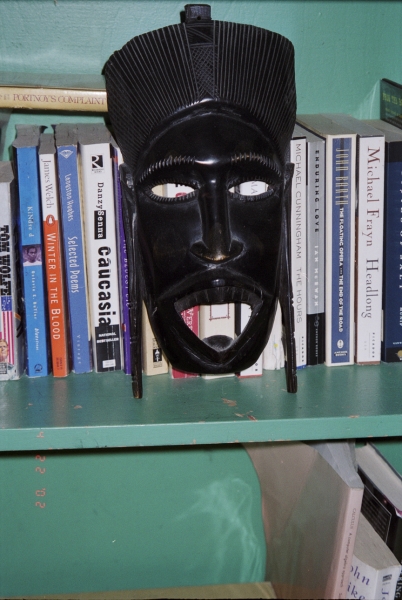I began to see an analyst on the 30th of November (no more, as of yet, than one staid visit a week).
I mentioned Long Life Cool White (Moyra Davey 2008) during the first session when she asked about my expectations and assumptions.
["As I approached Dr. Y's building, I'd scan the sidewalks for his small, compact frame, since he often arrived for my appointment just before I did. I once spotted him in profile walking down the avenue - he was holding a paper bag just under his chin and putting food in his mouth. Another time, even more unsettling since I wasn't even in his neighborhood, we found ourselves eye to eye, a mere ten feet apart, me standing on the Uptown platform at Grand Central, and him staring out at me from the window on the express train."p124]
Soon afterwards (with a desire to share the book with her) I placed it on hold at the LAPL. They have one copy: G passed it on to me when she took it out in 2010. I ought to purchase it. I let it wait at the branch a few weeks before picking it up (within which brief span my nephew was born and 2013 became 2014).
I also wished (both wishes, as I write, lose potency) to share a photograph I took of my brother's bookshelf in 2002.
The photograph's lodged in the back of a small notebook, next to her card, that I bring with me and have written in before and after each session. Each visit, I check the card to verify I'm going to the correct floor although how could one forget: it's more the office represents my interior maze and I fear losing my way.
After my last visit, I ordered Julia Kristeva's book on Melanie Klein (2001), so was able to pick them both up yesterday. This morning, I read the beginning of Kristeva's book, and this evening, re-read the video transcript of Fifty Minutes.
["I read a fair amount on psychoanalysis in those days and sometimes tried to introduce ideas from my reading into the analysis. But these attempts to connect on any sort of theoretical level with my shrink invariably backfired... The most Dr. Y would concede was that my reading was my way of trying to get closer to him."p131]
I am also reading a downloaded copy of Meira Likierman's book on Klein, which I like more than Kristeva's. I'm just now passing over the passages devoted to Ferenczi.
My mother chose the color of the room (it covered the bookshelves and the walls) and the mask (given to us by a relation) is her doing too, at least as an object chosen to decorate his space. When I pulled this picture out to look at it a few years ago, I noticed the word "Caucasia" and then Langston Hughes and Octavia Butler. Nothing stranger had ever happened. I notice (now) James Welch.
I scanned the negative and printed it out and over the next year put it on my studio-wall and took it down and put it up again. I was working for a writer and she came to give me a studio visit. She noticed Caucasia. Then Senna's family moved into her house; I met Senna's husband to give him the keys and wrote asking if he'd want to borrow my car while I was traveling all summer. He said no (in truth my car's a nightmare). While in Paris, I went to hear Clark Coolidge and Thurston Moore at Maison de la Poésie. As I scanned the leaflet for upcoming events, I saw he was giving a reading and felt shy. I suppose the way these things affect me (the pleasure of the coincidence: do I make so much of them to feel full? and then culpable: it turns shallow when spoken) makes me a nightmare employee.
Should I not reach beyond narrative? Or lay it bare lonely like salt.
Who is this "I"? who produces backstory.
The I (horror) recognizing Aunt Consuelo's voice as her own.
Last week a woman from NPR stopped me to interview me for a story about an accident on the Gold Line. I said "Someone must willfully disregard the signs to step in the path of an oncoming train." She asked my name but, not wishing to be attached to my judgments, I refused her.
